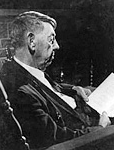
On 11 May 1935 the General Assembly of North Carolina passed a resolution empowering the governor to appoint a poet laureate for the state. The position remained empty until 1948, when outgoing governor Gregg Cherry chose Arthur Talmadge Abernethy (1872-1956) to serve as poet laureate of North Carolina. Cherry's choice was never publicly announced, but in 1949 Governor William Kerr Scott reappointed Abernethy to the position. Abernethy, son of the founder of Rutherford College, was educated at Rutherford and completed graduate work at Trinity College (now Duke University) and Johns Hopkins University in Baltimore. He was a noted classical scholar who began teaching Latin at Rutherford at age 17. During his lifetime, Abernethy wrote for several newspapers and published numerous works of theology. Since his literary reputation was based more on his journalism and theological writing than on his poetry, Abernethy's appointment was somewhat controversial.
Wilkes County poet James Larkin Pearson (1879-1981) was appointed to take over the post of poet laureate in 1953. Pearson was a nationally respected poet and rumored favorite of Upton Sinclair. In sharp contrast with Abernethy's intellectual upbringing, Pearson was born in a log cabin and claimed to have only 12 months of formal schooling. After working in the newspaper business for a while, Pearson opened a printing press in the basement of his farmhouse. From this location, he published several volumes of his own poetry and two original periodicals, The Fool Killer and The Literary South. Pearson balanced literature with agriculture and even claimed to have composed most of his early poems while plowing his family's fields. Pearson held the office of poet laureate until his death at age 102.
After Pearson's death in 1981, journalist and poet Sam Ragan was appointed to fill the post of North Carolina poet laureate. Ragan, an award-winning poet, was also a veteran of 50 years of newspaper work and a well-known patron of the arts. In 1965 Ragan was chosen to direct the North Carolina Arts Council, and in 1972 he helped establish the State Department of Cultural Resources. Ragan was also among the founders of the North Carolina School of the Arts (1963). Ragan's 1996 death left the office of poet laureate unfilled. In December 1997, Governor James B. Hunt appointed Fred Chappell North Carolina's poet laureate. Born in Canton and a graduate of Duke University, Chappell has written numerous books of verse, stories, and criticism as well as several novels. One of his first duties as poet laureate was to write and read a poem in August 1998, when President Bill Clinton visited the state to designate the New River as an American Heritage River. On 24 Feb. 2005 Kathryn Stripling Byer of Cullowhee was appointed by Governor Michael Easley to succeed Chappell as poet laureate of North Carolina. Cathy Smith Bowers was named North Carolina's Poet Laureate in January 2010 by Governor Beverly Perdue and served until 2012. Joseph Bathanti was named North Carolina's Poet Laureate on August 30, 2012 by Governor Beverly Perdue and served until 2014. Valerie Macon was named North Carolina's Poet Laureate on July 11, 2014 by Governor Pat McCrory, but resigned on July 17, 2014. Shelby Stephenson was named North Carolina's Poet Laureate on December 22, 2014 by Governor Pat McCrory. Jaki Shelton Green was named North Carolina's Poet Laureate on July 1, 2018 by Governor Roy Cooper. More information about past poet laureates can be found here.
Watch an interview with North Carolina Poet Laureate Jaki Shelton Green, August 17, 2018.